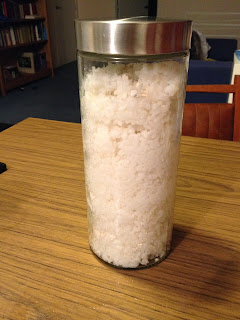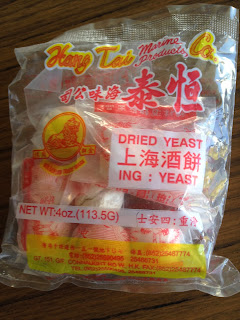 |
| Rice wine at the beginning |
I was inspired to make the rice wine by a thread on homebrewtalk.com, part of it's beauty is that it only uses two ingredients, cooked rice and rice yeast balls (generously delivered by a mate from Sydney). The method is very simple:
- Rinse and cook 2 cups of rice, it needs to be fairly glutinous type. Let it cool to room temperature.
- Pack the rice into a large, clean jar, layering rice and a crushed up yeast ball. Cover the jar with a loose fitting lit or gladwrap/aluminium foil secured with a rubber band. You want some air to be able to escape but keep it protected from other bugs.
- Give it time in a warm but dark place, mine lives under a cloth at the top of a cupboard.
- After 3 or 4 weeks at room temperature the wine should be ready. Strain the remaining rice solids through some cheesecloth and bottle it. The wine should be stored in the fridge as it may continue to ferment. Plastic bottles are probably a good idea to avoid the potential of exploding glass bottles.
 |
| Look for these at Asian supermarkets |
That's it! Over the time in the jar an enzyme produced by the mould from the yeast balls will break down the rice, and the yeast will ferment the sugars produced by the enzyme. Mine is 4 or 5 days in and the rice in my jar is floating on top of 3cm of liquid. It’ll come out somewhere around 20% ABV. You can try different kinds of rice, different methods of preparation, and addition of fruit post fermentation. There's lots more fun to be had with this I think.

.JPG)